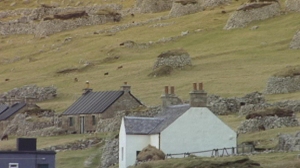Patience
In 1986 I got a job with the Manpower Services Commission. I worked in the old orange Jobcentres with the bubbly writing and the psychedelic chairs. My job was to find other people a job. By the time i worked there people no longer HAD to visit the Jobcentres, they went because that was where jobs were advertised.Through the years I moved onto be the ex-offenders officer, the Disablement Resettlement Officer, the Ex-Regs officer, the overseas workers officer – all these posts were about giving specialist help to certain people to help them find jobs.
I then became a Restart Interviewer- late 80s – loads of people out of work and I did 60 interviews a week to get through them all. This also meant new rules and new targets – stricter benefits regime targets – SBR. For the first time we could stop someone’s benefits for not Actively Seeking Work and they would not get their giro. Their money was stopped for the fortnight and an Adjudication officer would make a final decision. The training for this stressed the need to be careful when using this power, to remember that we are people’s last hope and to always take care that we were doing the right thing. In those days you had to issue a warning letter which said if the next time you come in you haven’t taken these steps to find work the you will lose your benefit for the fortnight. I remember saying to people “Do you understand? You have to do what you are supposed to do or you will get no money- is that clear? Mostly people did what they were supposed to do, mostly we didn’t have to stop they money. But some people we did. It was, however, always the absolutely last option.
Time moves on and so did I. Claimant Adviser, Benefit Section Manager, Business Manager, Manchester, Caithness, New Deal. The rules changed, we saw integration of Unemployment Benefit Offices and Jobcentres and the targets changed, I did so much training – I could clerically assess benefits, I could work out tax rebates, I understood RITYs, Widows Running Start, share fisherman rules and I could even handle the importing and exporting of Benefits to and from the UK. I worked with Jean, a fabulous deputy who could rate a benefit claim in 2 minutes flat, took no nonsense and was respected by staff and claimants alike. Through all this work and all the changes the word used when discussing the rules was “compassion” – we were always told that we should apply the rules with compassion.
As a Jobcentre Manager, I became responsible for my office achieving these targets, and boy! were you aware if you didn’t. Performance was all. Monthly performance reports, quarterly reviews with your Disrict Manager, 6 monthly reviews, annual performance reviews. Daily or weekly contact wit District office if you were failing. Make no mistake performance was everything but in those days targets were about getting people into jobs. SBR targets still existed but paled into insignificance beside the drive to find jobs for people.
During all this time, all this training, even during the Restart Interviews of the 80s, it was never deemed that we needed training in dealing with people who were suicidal because of what we did. The training taught us that if someone was angry, aggressive, then it was often because we were their last hope and we needed to be aware of that and make sure that we were thoughtful and compassionate when dealing with people. But we never had to think about causing their suicide.
In the 90s the service went big on Customer Service, aquiring Chartermark awards, dealing with folk like they were “customers”, making sure they had a great service from the people who dealt with them and compassion in applying the rules. People came first. Stopping someone’s money still happened but it was always a last resort and never ever done without warning.
Fast forward to today- I haven’t worked for DWP for a long time and I thank goodness for that. In all that time I found very few people who didn’t want to work. I remember them, i remember their faces, their stories and sometimes even their names. I can do that because they were so few and far between. Today, it’s ALWAYS the fault of the lying scrounging benefit claimant. Bus late? Funeral to go to? Interview that clashes with your signing on time? Sick? Disabled? Caring for someone? You are lying, it’s your fault and so you won’t get paid. Often no warning, often no consideration given to the reasons for YOUR failure to meet the rules, and definitely, definitely no compassion.
An organisation that is run this way, is being used to subjugate, denigrate and control the population. Does that sound like something out of a futuristic post apocalyptic movie? It does and it might make me sound like Citizen Smith, but it is happening nevertheless. Jobcentreplus appears to have become the ideological sledge hammer of the Tory party. It is designed to smash the teeth of those out of work so that they have no voice. It is designed to frighten people into doing whatever they are told to do in order that the Conservative Party can achieve their ideological desire for a tiny welfare state where private companies run our social security system and the poor are out of sight and out of mind – left without a voice and definitely without compassion. And with the Labour Party abstaining left right and centre, they are pretty much left to get on with it.
I used to think that this UK government had no understanding of the consequences of their actions. That they were oblivious to to the impact of their targets, their rules. I used to think that because they had never had to sit with the curtains shut because they didn’t have enough to pay the milkman who was knocking at the door, they didn’t understand how it felt. I used to look at the front benches and wonder if any of them like me, had ever sat on the bed crying because they had no idea how to feed their boys, if any of them, like me, had not been able to afford to heat their home, if any of them, like me, had put cardboard in their shoes cos they were leaking and the kids needed shoes so mine had to wait. I used to wonder if any of them had ever stepped outside their lives for long enough to know the powerlessness, the desperation, the pain that comes from experiencing those things. Because I was sure that if they had then they would not be treating people the way they do. They would not be making the rules that they do, setting the targets that they do. They would find a better way, a different way to move people into work.
I used to think that they didn’t know. But they do. They know fine well. And that is why they are arranging suicide training for their staff. They KNOW how desperate their policies are making people. They KNOW the consequences of their policies. They KNOW it, and they don’t care.
That is disgusting, it is cruel and it is immoral.
It is also a compelling reason for Independence. The ability to design our own social support system. To do something that works for Scotland. The ability to spend the money we have on moving people into work rather than spending millions on sanctions and appeals. The ability to refuse to put money into the pockets of shareholders of private companies who make their profits of the misery of the poor, running failing work programmes, getting people to work for nothing on pseudo “work trials”. These are the things Independence would give us the ability to do differently – to change. The chance, not simply to recognise when people are desperate but to prevent them becoming desperate in the first place. The crumbs falling from the table set out by Lord Smith are not enough.
And yet I know we need to be patient, our Scottish Government paying the bedroom tax for people to protect them from having to bath their disabled son in a paddling pool in their living room, (did anyone not feel like crying reading that story?) providing crisis payments to people when that has been abandoned in the rest of the UK, council tax reduction scheme, Scottish independent living fund all being supported in Scotland. We need to be patient, we need to speak up for the poor, the vulnerable and those who have no voice. We need to show that we can do things better – to those people on all sides of the political spectrum. To rush into a second referendum would be the worst thing we could do. Not simply because if we lost again it would mean independence off the agenda pretty much for ever and would break our hearts, but because not winning, not getting it right condemns the people already struggling, those people that I have spoken about to being governed without compassion. If we don’t get it right then we fail them and we must not do that. That means we must have SNP for constituency and for list votes in 2016 and not get sucked into the attempts by others to garner support for their own personal ambitions. It means patience and good governance – working within the Westminster system to hold both the Tories and the Labour Party to account. It means all of us, MPs, MSPs, Councillors, Activists standing up for the people of Scotland. If we do these things then it will happen – Scotland will be Independent. Patience people, patience.





